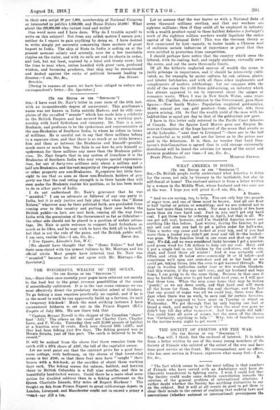THE WONDERFUL WEALTH OF THE OCEAN. [To THE EDIT()); or
TELE " SPECTATOR."] Sra,—More than once recently your pages have referred not merely to the food but to the great revenue possibilities of the ocean if scientifically cultivated. It is to the vast ocean common we can most effectively direct the predatory Socialist school of thinkers. To go fishing• a man requires practically no capital, and if he is in the mood to work he can apparently build up a fortune, its unit a twopenny fish-hook! Much the most striking instance I have -encountered hitherto is set out in the Prince Rupert (B.C.) Empire of July 10th. We are there told that "Captain Bryant Newell is the skipper of the Canadian `share ' boat Atli.' The others on the vessel are Charley Carr, Charley Lowe, and F. Wicks. Yesterday they sold 32,000 pounds of halibut at a fraction over 13 cents. Each man cleared $835 (X167), and they had been fishing just five days. The fishing ground was in llecate Straits, just off this port. The catch is believed to be the record."
It will be noticed from the above that there remains from the catch still a fifth share of £167, the toll of the capitalist owner.
Let me next point out that the contract price for a good four- room cottage, with bathroom, on the shores of that forest-clad ocean is but .2100; so that these foul. men have " caught " their homes with a fish-hook, at the sacrifice of about three working days each. The fishing season for salmon, halibut, and herring there in British Columbia is a full nine months, and this in beautifully land-locked waters. Could there be a more ideal occu- pation for disabled soldiers than in a fishing settlement on the Queen Charlotte Islands, fifty miles off Rupert Harbour ? The freight on fish •from Prince Rupert to great cold-storage depots in London,. Liverpool, and Manchester ought not to exceed a penny a "'and—aav £10 a ton.
Let us assume that the war leaves us with a National Debt of seven thousand millions sterling, and that our workers are eighteen millions; then if they could all be employed in industry with a wealth product equal to these halibut fisheries a fortnight's work of the eighteen million workers would liquidate the entire capital of the National Debt! This was the German theory as first enunciated by List—namely, to foster inside a Chinese wail of exclusion certain industries of importance so great that they were entitled to protection from competition.
I should perhaps here notice that the country which owns the littoral, with its coaling, bait, and supply stations, virtually owns the ocean, and not the mere three-mile limits.
Of all the hitherto neglected sources of wealth the ocean is facile princeps in importance, and it should be intensively culti- vated, as, for example, by oyster culture, by cod, salmon, plaice, and lobster hatcheries, and with all those other implements and complements of modern ichthyology. Let me compare with the yield of the ocean the yield from gold-mining, an industry which has always appeared to me to represent about the apogee of economic waste. When I was in New South Wales, some years since, Mr. Coghlan, the statistician to the Government, gave these figures :—New South Wales: Population employed gold-mininz, 16,000; annual per cap. gold product—from alluvial, £14; from quartz mining, £34. So that the wealth yield of the man with his halibut-line is equal per day to that of the gold-miner per year.
I have in this letter only referred to the Pacific Coast fisheries of Canada. But the figures Lord Morris gave our Empire Re- sources Committee of the huge harvest of the ocean that awaits as of the Labrador, " next door to Liverpool "—these are to the full as wonderful as to yield, and are far lower as to the prices now paid to the fisherman. It is, then, no wonder that Lord Duu- raven's Sub-Committee is agreed that in cold storage universally distributed will be found the solution for many of the social and revenue problems of our time.—I am, Sir, &c.,


























 Previous page
Previous page